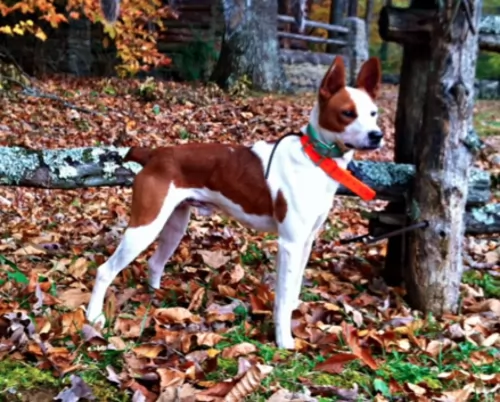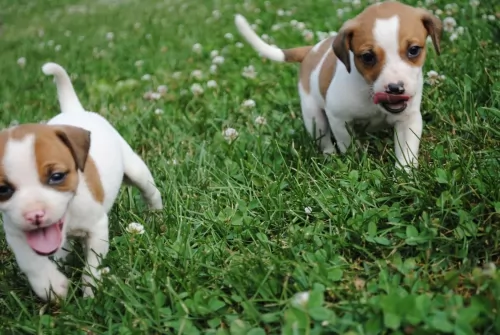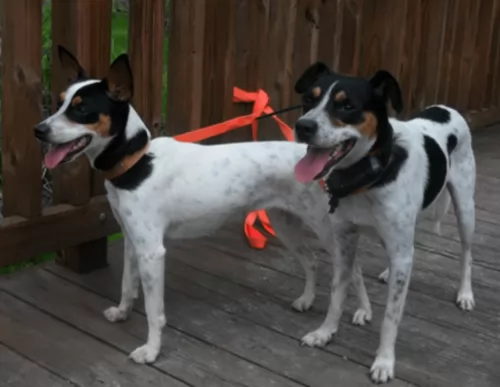 Petzlover
Petzlover Barbet is originated from France but Mountain Feist is originated from United States. Barbet may grow 10 cm / 4 inches higher than Mountain Feist. Barbet may weigh 26 kg / 57 pounds lesser than Mountain Feist. Barbet may live 3 years less than Mountain Feist. Both Barbet and Mountain Feist has almost same litter size. Barbet requires Moderate Maintenance. But Mountain Feist requires Low Maintenance
Barbet is originated from France but Mountain Feist is originated from United States. Barbet may grow 10 cm / 4 inches higher than Mountain Feist. Barbet may weigh 26 kg / 57 pounds lesser than Mountain Feist. Barbet may live 3 years less than Mountain Feist. Both Barbet and Mountain Feist has almost same litter size. Barbet requires Moderate Maintenance. But Mountain Feist requires Low Maintenance
 The Barbet is an ancient European waterdog, with the first references to it coming way back from 1387. This breed is thought to serve as a common ancestor for several other waterdogs, and these include the poodle. The breed was used to retrieve water fowl from water, and today it is used as a gundog and as a companion.
The Barbet is an ancient European waterdog, with the first references to it coming way back from 1387. This breed is thought to serve as a common ancestor for several other waterdogs, and these include the poodle. The breed was used to retrieve water fowl from water, and today it is used as a gundog and as a companion.
The name ‘Barbet’ comes from the French word for beard, which is ‘barbe’. The Kennel Club has announced that this dog is to be described as being in a class of its own, and it has become the 220th pedigree breed.
 In the Southern portion of North America, the Mountain Feist was developed. It is the Ozarks and Southern Appalachia that the Mountain Fiest calls his ancestral home. The breed dates back centuries and looks very much like a Jack Russell or rat terrier. George Washington, Abraham Lincoln and William Faulkner all featured the breed in their writings. For Washington it was his diary, Lincoln the poem “The Bear Hunt” and Faulkner “Go Down Moses”. These dogs, much like the Curs, were an important part of the early pioneer days in America.
In the Southern portion of North America, the Mountain Feist was developed. It is the Ozarks and Southern Appalachia that the Mountain Fiest calls his ancestral home. The breed dates back centuries and looks very much like a Jack Russell or rat terrier. George Washington, Abraham Lincoln and William Faulkner all featured the breed in their writings. For Washington it was his diary, Lincoln the poem “The Bear Hunt” and Faulkner “Go Down Moses”. These dogs, much like the Curs, were an important part of the early pioneer days in America.
The name Feist means a noisy, small dog in ancient languages. The Feist was developed in the South, the rural areas, in order to hunt and eliminate vermin and small prey animals. The breed was originally a cross between British terriers and hounds from Native Americans. Many others think the feist is not a breed but a type, a working dog which can vary individual to individual.
The Mountain Feist of today has been bred for hunting performance over generations of time. They hunt racoons, squirrel and rabbits among others. They can track even larger game. Other varieties of the feist include the Bench Legged Feist and the Pencil-tail Feist. This is an energetic working dog, curious, intelligent and alert. It is a loud, barky dog that needs to learn a “no bark” command or it may drive you crazy. The breed make good hunting dogs, watch dogs and companions.
The breed was recognized by the United Kennel Club (UKC) in 2015, but not by the AKC or American Kennel Club. Other breed organizations include the National Cur & Feist Breeder’s Association, The National Feist Breeder’s Association, The American Treeing Feist Association, and the Shadowtails Outdoors Group.
 The Barbet is a medium-sized breed of French water dog, measuring anything between 52–66cm in height. The dog is known for his thick, curly textured coat and even the head and tail are covered with this dense hair. His coat is waterproof.
The Barbet is a medium-sized breed of French water dog, measuring anything between 52–66cm in height. The dog is known for his thick, curly textured coat and even the head and tail are covered with this dense hair. His coat is waterproof.
The coat can vary in color and these colors can be brown, grey, white, fawn or black. The dog isn’t a heavy shedder. The Barbet’s tail is long and somewhat raised but not erect. He has long, wide pendant ears set at eye height, the skull is broad and the neck short and strong.
With his kind brown eyes, it simply adds to the kindly expression of this attractive gun dog. He is a friendly, fun-loving dog, and makes a great family pet. He loves to swim and in fact has webbed paws to assist him with his swimming. Some dog owners say that this intelligent active breed can be a great watchdog, while others say the being a guard dog isn’t a particularly strong characteristic.
 The Mountain Feist is a medium sized dog with pointy ears that are long and fold over. With their sharp nails that are curved they can climb. Their hind legs are strong to support that activity as well. They have small, dark eyes, a black nose and a muzzle that is medium length and a round skull. The neck is strong, and they have a pretty deep chest. The Mountain Feist tail is bushy, high and erect. There coats come in a variety of colors including blue, black, white, red and brown with the brown being the most common.
The Mountain Feist is a medium sized dog with pointy ears that are long and fold over. With their sharp nails that are curved they can climb. Their hind legs are strong to support that activity as well. They have small, dark eyes, a black nose and a muzzle that is medium length and a round skull. The neck is strong, and they have a pretty deep chest. The Mountain Feist tail is bushy, high and erect. There coats come in a variety of colors including blue, black, white, red and brown with the brown being the most common.
There is a lot of variation of make up and type within the breed itself. Until the last decade or so the breed was fairly isolated among squirrel hunters and there was little cross breeding with other dogs. On the other hand, dogs in the regions where the Mountain Feist was isolated were crossed with them to give them the tree climbing ability, change their size, sharpen their senses or one particular sense and change their appearance.
This is why in different regions you will find Mountain Feist with attributes of the Curs, or the Elkhounds, the Terriers, Spitz or Coonhounds. This accounts for the various types of Mountain Feist Dogs.
 Most Barbets do superbly well with children and are naturally gentle with them. It is always important to teach children to respect animals and to be kind towards them. Even a gentle dog like the Barbet can turn aggressive if taunted beyond their endurance.
Most Barbets do superbly well with children and are naturally gentle with them. It is always important to teach children to respect animals and to be kind towards them. Even a gentle dog like the Barbet can turn aggressive if taunted beyond their endurance.
Barbets are social, good mixers and they get on well with other pets in the family, more so when they have been properly socialized. As a Sporting breed, the Barbet is energetic and loves to be involved in games and activities. He is such a versatile dog – gentle and friendly and he makes a wonderful devoted pet. Of course, he is also suited for use as a working dog, after all this breed was originally used for hunting waterfowl.
Treat him well and the thanks you’ll get will is unconditional friendship and loyalty.
 Yes, they very much enjoy playing with children.
Yes, they very much enjoy playing with children.
Tree climbing and stamina.
They need space and land on which to run every day. If you are in an apartment, make sure you have access to a dog park.
They are very intelligent and learn quickly. They love to please but can also be stubborn.
 The Barbet is a rare breed and therefore not much is known about particular health issues affecting him. Some health issues that you will need to be alert about with your Barbet are ear infections, hernias and hip dysplasia.
The Barbet is a rare breed and therefore not much is known about particular health issues affecting him. Some health issues that you will need to be alert about with your Barbet are ear infections, hernias and hip dysplasia.
A veterinarian should be consulted if your dog shows signs of these ailments. The risk of a Barbet developing any health condition can always be significantly reduced by making sure you buy your Barbet from a reputable breeder. If he is fed well and taken to the vet when he does get sick, he can live to be 13 to 15 years of age.
 Like most breeds that are isolated, the Mountain Feist does not have a lot of known genetic health issues. They are generally healthy and known to live as many as eighteen years. Perhaps the biggest threat to their lives is the hunting accident, harming joints or paws in hunting situations or being attacked by a larger animal. There are no real genetic threat. Of course, with any dog that has folded ears there is always the possibility of infection or allergies. Keep their ears clean. The other possible concern is hip dysplasia in such an active dog. This can lead to lameness or arthritis. Obesity is another concern that could also lead to hip dysplasia.
Like most breeds that are isolated, the Mountain Feist does not have a lot of known genetic health issues. They are generally healthy and known to live as many as eighteen years. Perhaps the biggest threat to their lives is the hunting accident, harming joints or paws in hunting situations or being attacked by a larger animal. There are no real genetic threat. Of course, with any dog that has folded ears there is always the possibility of infection or allergies. Keep their ears clean. The other possible concern is hip dysplasia in such an active dog. This can lead to lameness or arthritis. Obesity is another concern that could also lead to hip dysplasia.
 The Barbet’s coat is longish and curly, much like a poodle, and long, wooly coat This being the case, moderate maintenance is required. Brushing and grooming twice a week will be necessary to keep the coat from matting too much. In fact, some Barbet owners prefer to keep their Barbets professionally groomed so that the thick hair is fairly short all over.
The Barbet’s coat is longish and curly, much like a poodle, and long, wooly coat This being the case, moderate maintenance is required. Brushing and grooming twice a week will be necessary to keep the coat from matting too much. In fact, some Barbet owners prefer to keep their Barbets professionally groomed so that the thick hair is fairly short all over.
The dog’s ears will also need to be kept clean and dry.
If your Barbet is a farm dog, used for hunting or working purposes, make sure to buy dog food formulated for active dogs. Your Barbet puppy up to the age of 3 months will require 4 meals a day. When your Barbet reaches a year of age he can be fed one or two bowls of food. Speak to your veterinarian about top-quality wet- and dry foods. Every dog will require raw meat added into their food once in a while.
Make sure there is a constant supply of cool, fresh water and also wash his food and water bowls regularly.
The Barbet is an intelligent breed and therefore trainable. Dog owners who care for their pets, see to it that they are trained and have been socialized. This makes dogs much nicer to live with as they get on well with children and other pets and they don’t bark incessantly.
The Barbet is a working breed so you can’t just leave him in your back garden day after day. To stay healthy and happy, he will need to be played with, taken for walks and exercised regularly.
 These are very active pups who need a high protein, high quality dry food. Feed a cup to a cup and half broken down into three meals daily. Do not overfeed your puppy.
These are very active pups who need a high protein, high quality dry food. Feed a cup to a cup and half broken down into three meals daily. Do not overfeed your puppy.
Feed the adult about two cups a day broken into two meals. Again, you are looking for a high quality, high protein dry food. Do not overfeed and watch for obesity.
This is a very active breed – a hunting dog with a lot of stamina, strength and energy. They need plenty of exercise as the terrier side of them is just a little hyper. They need at least two walks per day, and they are not great apartment dogs. They need both mental and physical stimulation. This little dog can keep going at a good rate for a long time.